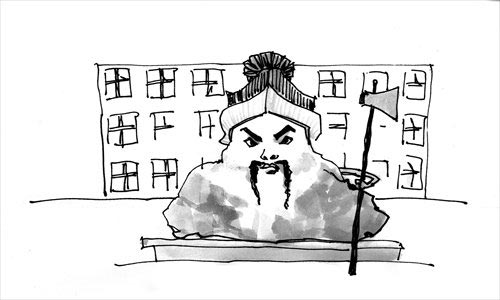 |
| (Illustration: Luo Xuan/GT) |
Apart from its food, China is also well-known for its culture - and in particular, fengshui, an art based on the belief that the arrangement of specific items within a room or building can direct a person to certain destinies.
Despite being long-regarded as a superstitious activity by Chinese authorities, fengshui is popular among individuals, and in the workplace, due to its lengthy history.
Said to have been formed in the Warring States period (475BC-221BC) over 2,200 years ago, fengshui has made headlines once again, this time after China University of Political Science and Law (CUPL) in Beijing was initially thought to put a giant tons-heavy rock from Taishan Mountain at its Xueyuan Road campus to foster prosperity.
Taishan Mountain, the preeminent of China's five sacred mountains, rose to new heights in fame in 2000, when an age-old folklore was revived and bestowed rocks from the mountain with a somewhat efficacious effect.
Many more people started to believe that the rocks, which had been enchanted by a legendary exorcist, are able to ward off evil spirits, and foster good fortune, wealth and harmony.
In fact, towns and villages located around Taishan Mountain have since prospered from their close proximity to the site, as average housing prices in the area have shot up to 8,000 yuan ($1,307) per square meter.
But after much public attention over the nature of the sacred rock weighing tens of tons, it appears that CUPL is not - at least, publicly - a believer in the rocks said to hold positive energy from Shandong Province's famous mountain.
The school addressed the issue on Wednesday, saying that the rock displayed at its campus was "not about fengshui," but rather meant to mark the university's 30th anniversary of its graduate school.
The remark came just days after an unnamed vice director of one of the university's departments posted an online photograph of the stone, claiming that it represented the "bliss of the law."
Yet what netizens have taken away from all of the news is that rocks from Taishan Mountain must truly be sacred.
It is said that local governments are in favor of such grand rocks, as they are believed to imply stability and safety.
Local courts, for example, often choose to place stone carvings of a unicorn or qilin, a mythical Chinese chimerical creature, outside courthouses to symbolize strength in the judicial system.
In Yucheng, Shandong Province, three giant stones stand in the main square. Each was consecutively erected by the incumbent leader of the former city head. It seems that every successor believed it was a sacred stone that got their predecessor promoted.
Local officials everywhere practice their own superstitious beliefs. Some government leaders refuse to arrange their offices on the eighth floor of a building, opting instead for the seventh.
This stems from a traditional Chinese idiom, which literally translates to "seven up, eight down," which is often used to describe an unsettled mind.
Like political and religious beliefs, officials appear reluctant to drop the superstitions that they have long practiced. It is a daunting problem disturbing China's officialdom.
But it won't go away until we stop obsessing over superstitious beliefs. We should first start by asking officials: how will the placement of a stone help better govern a city or the nation?
 Gallery: Reveal the South Korean beauty production line
Gallery: Reveal the South Korean beauty production line Army aviation brigade in actual-troop drill
Army aviation brigade in actual-troop drill Top 10 Chinese provinces for the well-heeled
Top 10 Chinese provinces for the well-heeled  Baby born to save his sister - the story of a savior sibling
Baby born to save his sister - the story of a savior sibling Lady of mystery: Female SWAT team in prison disclosed
Lady of mystery: Female SWAT team in prison disclosed  Single mother, baby live in KFC restaurant for months
Single mother, baby live in KFC restaurant for months Fan Bingbing poses for Malaysian magazine Citta Bella
Fan Bingbing poses for Malaysian magazine Citta Bella Zhang Xinyi covers COSMOPOLITAN
Zhang Xinyi covers COSMOPOLITAN A collection of bizarre rooftop buildings around China
A collection of bizarre rooftop buildings around China Most significant architectural wonders
Most significant architectural wonders China, U.S. conduct joint anti-piracy drill
China, U.S. conduct joint anti-piracy drill  'Abandoned' life in cement boats in Huai River
'Abandoned' life in cement boats in Huai River 2013 Taiwan Int'l Tourism Expo kicks off in Taipei
2013 Taiwan Int'l Tourism Expo kicks off in Taipei Photo story: Take a gap year
Photo story: Take a gap year Nokia's Global Headquarters: visiting a declining empire
Nokia's Global Headquarters: visiting a declining empireDay|Week|Month